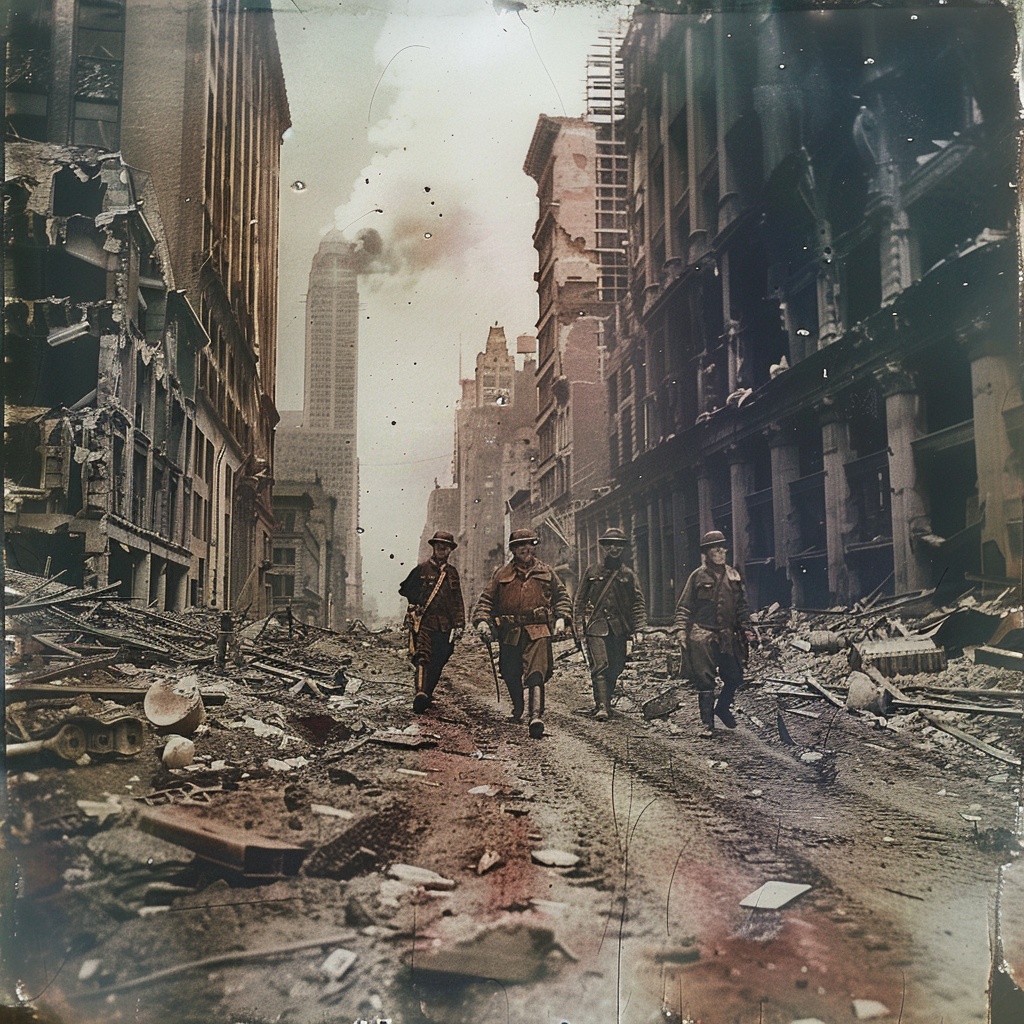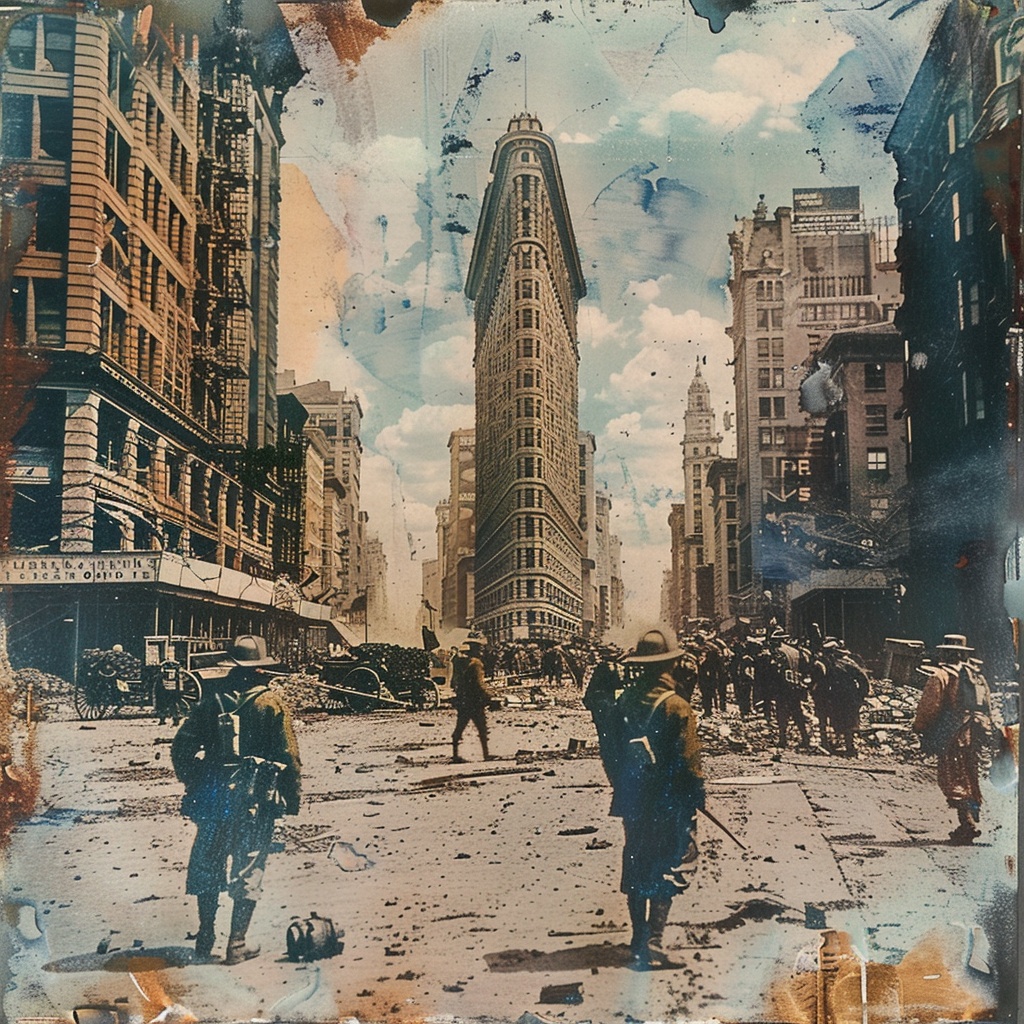THE DOOMSMAN (24)
By:
August 14, 2024

Set ninety years after the cataclysmic pandemic of 1925, Van Tassel Sutphen’s The Doomsman imagines a Kamandi-like future in which medievalized American tribes struggle with the marauding Doomsmen for control of the ruins of New York City… where a mad priest worships a powerful technology. HiLoBooks is pleased to serialize this 1905–1906 proto-sf novel for HILOBROW’s readers.
ALL INSTALLMENTS: 1 | 2 | 3 | 4 | 5 | 6 | 7 | 8 | 9 | 10 | 11 | 12 | 13 | 14 | 15 | 16 | 17 | 18 | 19 | 20 | 21 | 22 | 23 | 24 | 25 | 26 | 27 | 28 | 29 | 30.
THE EVE OF THE THIRD DAY
A touch upon Constans’s shoulder and a voice in his ear aroused him. He sprang to his feet; the sunshine was streaming through the glazeless casements, and Constans, being yet heavy with sleep, blinked against it as a man drunken with wine. Oxenford confronted him. “The attack?” questioned Constans, and for the life of him could not help yawning prodigiously.
Red Oxenford laughed. “In that case I should have pulled your ear off instead of wasting time shouting into it. By the thunders of God, man, but you sleep soundly.”
Constans was fully awake now. He glanced at the sun, which was high in the sky, and then at Oxenford’s gaunt face.
“I have left you to do the watching alone,” he said, apologetically.
“What matter?” was the indifferent answer. “For me slumber would not have meant forgetfulness, and the watching made the waiting so much the easier.”
Constans stood by the window looking across the Citadel Square and directly up the Palace Road. “I see no sign of Piers Major,” he said at length.
“Down in the square,” replied Oxenford, laconically.
In truth there was a most unusual activity pervading the stronghold of the Doomsmen. Already the long rows of guard-huts were tenanted by a throng of women and children, and the number was being constantly reinforced by fresh arrivals. Guards were pacing the walls, and a squad of the younger men were engaged in setting up the artillery machines for hurling stones so as to command the open space in front of the north gate. New ropes were being fitted to the torsion levers, and an ox-cart loaded with ammunition, in the shape of rounded boulders, creaked noisily through the gateway.
“The warning must have come down from the High Bridge at an early hour,” said Constans, thoughtfully. “How long has all this been going on?”
“Only within the last hour,” returned Oxenford. “I waited for the old gray wolf himself to seek his lair before arousing you. He has but just crawled into it — out of arrow-shot,” he added, regretfully.
Constans could see half a dozen of the green-jerkined guards lounging about the entrance to the White Tower, evidence that Dom Gillian was resting within. There was nothing to be seen of Quinton Edge, but surely he would not be far away from the storm-centre. Probably he was directing the defence at the northern boundary or even at the High Bridge.

Slowly the day dragged on for the watchers in the “Flat-iron.” It was impossible to form any conjecture as to how the preliminary conflict was proceeding; it was not even certain that it had begun. Piers Major had undoubtedly forced the passage of the bridge, but apparently he had been content with holding his advantage. He might not begin to move until late in the day, and he would proceed slowly and cautiously.
From time to time a messenger galloped down the Palace Road. At once he would be surrounded by an eager throng and escorted to the guard-room of the White Tower, where Ulick had set up his headquarters. For it was Ulick who had been left in command of the citadel garrison and intrusted with the preparations for the impending siege. Twice Constans had caught him fairly with his binoculars, and he could not be mistaken in the features and carriage of his friend. His friend — one might say the only friend that he had ever had — and Constans felt his heart heavy within him, knowing that they must henceforth walk on diverging paths.
Constans found it difficult to keep his men under discipline. It was all-important that their presence should be unsuspected by the enemy, but it would have been betrayed a score of times had not his vigilance intervened. Red Oxenford, in particular, grew more and more unmanageable; he had neither eaten nor slept now for three days, and the strain was telling on him. Finally he announced that he would wait no longer. The north gate was open, and what should prevent his walking straight up to the White Tower and sticking his boar-spear into the gray wolf’s hide? “And I will — by the seven thunders of God!” His voice rose into a shriek.
It took half a dozen men to gag and bind him; he lay on a truss of straw, his eyes fixed malevolently on Constans, whose orders had prevented him from carrying out a plan so eminently practicable.
The shadows were growing long when Piers Minor pointed out a cloud of dust far up the Palace Road. Later on they could distinguish the figures of men and horses. Stragglers and wounded began to dribble away from the fighting-line; they came running down the Palace Road, one by one, then in bunches of two and three and four. Piers Major, with his greatly superior force, was evidently driving the defenders back.
Half an hour later the conjecture became accomplished fact. The Doomsmen, retreating with admirable steadiness, fell back upon the shelter of the citadel walls. Quinton Edge, with a score of mounted cross-bowmen, brought up the rear, and he himself was the last man to pass through the north gate.
Three hundred yards away the Stockaders came suddenly into view, but it was close to sunset, the time for the evening meal, and, as though by mutual consent, both sides laid aside their arms for the homelier utensils of the cuisine. Down in the Citadel Square a hundred little fires started up, and as many pots and kettles began to bubble cheerfully. The invaders contented themselves with building huge bonfires, intended for warmth rather than for cooking, since their light marching order precluded the carrying of anything more than cold rations. From far up the avenue came the boom of an ox-horn, militant, almost brazen in its sonority. A drum, beaten noisily, rattled back an impudent defiance from the citadel.
RADIUM AGE PROTO-SF: “Radium Age” is Josh Glenn’s name for the nascent sf genre’s c. 1900–1935 era, a period which saw the discovery of radioactivity, i.e., the revelation that matter itself is constantly in movement — a fitting metaphor for the first decades of the 20th century, during which old scientific, religious, political, and social certainties were shattered. More info here.
SERIALIZED BY HILOBOOKS: James Parker’s Cocky the Fox | Annalee Newitz’s “The Great Oxygen Race” | Matthew Battles’s “Imago” | & many more original and reissued novels and stories.
